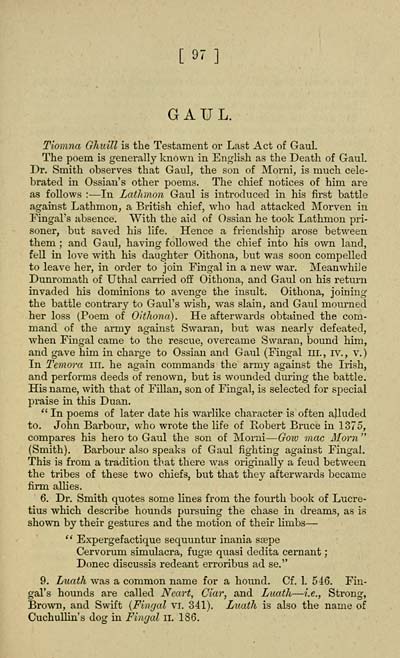Download files
Complete book:
Individual page:
Thumbnail gallery: Grid view | List view

[97]
GAUL.
Tiomna Gliuill is the Testament or Last Act of Gaul.
The poem is generally knovvn in Engiish as the Death of Gaul.
Dr. Smith observes that Gaul, the son of Morni, is much cele-
brated in Ossiau's other poems. The chief notices of him are
as follows : — In Lathmo7i Gaul is introcluced in his first battle
against Lathmon, a British chief, who had attacked Morven in
Fingal's absence. With the aid of Ossian he took Lathmon pri-
soner, but saved his Hfe. Hence a friendship arose between
them ; and Gaul, having foUowed the chief into his own hind,
fell in h)ve with his daughter Oithona, but was soon compelled
to leave her, in order to join Fingal in a new war. Meanwhile
Dunromath of Uthal carried off Oithona, and Gaul on his retvirn
invaded his dominions to avenge the insult. Oithona, joining
the battle contrary to Gaul's wish, was slain, and Gaul mourned
her loss (Poem of Oithona). He afterwards obtained the com-
mand of the army against Swaran, but was nearly defeated,
when Fingal came to the rescue, overcame Swaran, l30und him,
and gave him in charge to Ossiau and Gaul (Fingal lii. , iv. , v. )
Tn Temora lll. he again commands the army against the Irish,
and performs deeds of renown, but is wounded during the battle.
His name, with that of FiUan, son of Fingal, is selected for special
praise in this Duan.
*' In poems of later date his warlike character is often aUuded
to. John Barbour, who wrote the life of Robert Bruce in 1375,
compares his hero to Gaul the son of Morni — Goiv mac Morn "
(Smith). Barbour also speaks of Gaul fighting against Fingal.
This is from a tradition that there was originally a feud between
the tribes of these two chiefs, but that they afterwards became
fìrm aUies.
6. Dr. Smith quotes some lines from the fourth book of Lucre-
tius which describe hounds pursuing the chase in dreams, as is
shown by their gestures and the motion of their limbs —
" Expergefactique sequuntur inania ssepe
Cervorum simulacra, fugse quasi dedita cernant ;
Donec discussis redea,nt erroribus ad se."
9. Luath was a common name for a hound. Cf. 1. 546. Fin-
gal's hounds are called Ncart, Ciar, and Luath — i.e., Strong,
Brown, and Swift {Fingal vi. 341). Luath is also the name of
Cuchullin's dog in Fingal il. 186.
GAUL.
Tiomna Gliuill is the Testament or Last Act of Gaul.
The poem is generally knovvn in Engiish as the Death of Gaul.
Dr. Smith observes that Gaul, the son of Morni, is much cele-
brated in Ossiau's other poems. The chief notices of him are
as follows : — In Lathmo7i Gaul is introcluced in his first battle
against Lathmon, a British chief, who had attacked Morven in
Fingal's absence. With the aid of Ossian he took Lathmon pri-
soner, but saved his Hfe. Hence a friendship arose between
them ; and Gaul, having foUowed the chief into his own hind,
fell in h)ve with his daughter Oithona, but was soon compelled
to leave her, in order to join Fingal in a new war. Meanwhile
Dunromath of Uthal carried off Oithona, and Gaul on his retvirn
invaded his dominions to avenge the insult. Oithona, joining
the battle contrary to Gaul's wish, was slain, and Gaul mourned
her loss (Poem of Oithona). He afterwards obtained the com-
mand of the army against Swaran, but was nearly defeated,
when Fingal came to the rescue, overcame Swaran, l30und him,
and gave him in charge to Ossiau and Gaul (Fingal lii. , iv. , v. )
Tn Temora lll. he again commands the army against the Irish,
and performs deeds of renown, but is wounded during the battle.
His name, with that of FiUan, son of Fingal, is selected for special
praise in this Duan.
*' In poems of later date his warlike character is often aUuded
to. John Barbour, who wrote the life of Robert Bruce in 1375,
compares his hero to Gaul the son of Morni — Goiv mac Morn "
(Smith). Barbour also speaks of Gaul fighting against Fingal.
This is from a tradition that there was originally a feud between
the tribes of these two chiefs, but that they afterwards became
fìrm aUies.
6. Dr. Smith quotes some lines from the fourth book of Lucre-
tius which describe hounds pursuing the chase in dreams, as is
shown by their gestures and the motion of their limbs —
" Expergefactique sequuntur inania ssepe
Cervorum simulacra, fugse quasi dedita cernant ;
Donec discussis redea,nt erroribus ad se."
9. Luath was a common name for a hound. Cf. 1. 546. Fin-
gal's hounds are called Ncart, Ciar, and Luath — i.e., Strong,
Brown, and Swift {Fingal vi. 341). Luath is also the name of
Cuchullin's dog in Fingal il. 186.
Set display mode to: Large image | Transcription
Images and transcriptions on this page, including medium image downloads, may be used under the Creative Commons Attribution 4.0 International Licence unless otherwise stated. ![]()
| Early Gaelic Book Collections > J. F. Campbell Collection > Dàn an Deirg agus Tiomna Ghuill (Dargo and Gaul) > (133) |
|---|
| Permanent URL | https://digital.nls.uk/77289121 |
|---|
| Description | Volumes from a collection of 610 books rich in Highland folklore, Ossianic literature and other Celtic subjects. Many of the books annotated by John Francis Campbell of Islay, who assembled the collection. |
|---|
| Description | Selected items from five 'Special and Named Printed Collections'. Includes books in Gaelic and other Celtic languages, works about the Gaels, their languages, literature, culture and history. |
|---|

